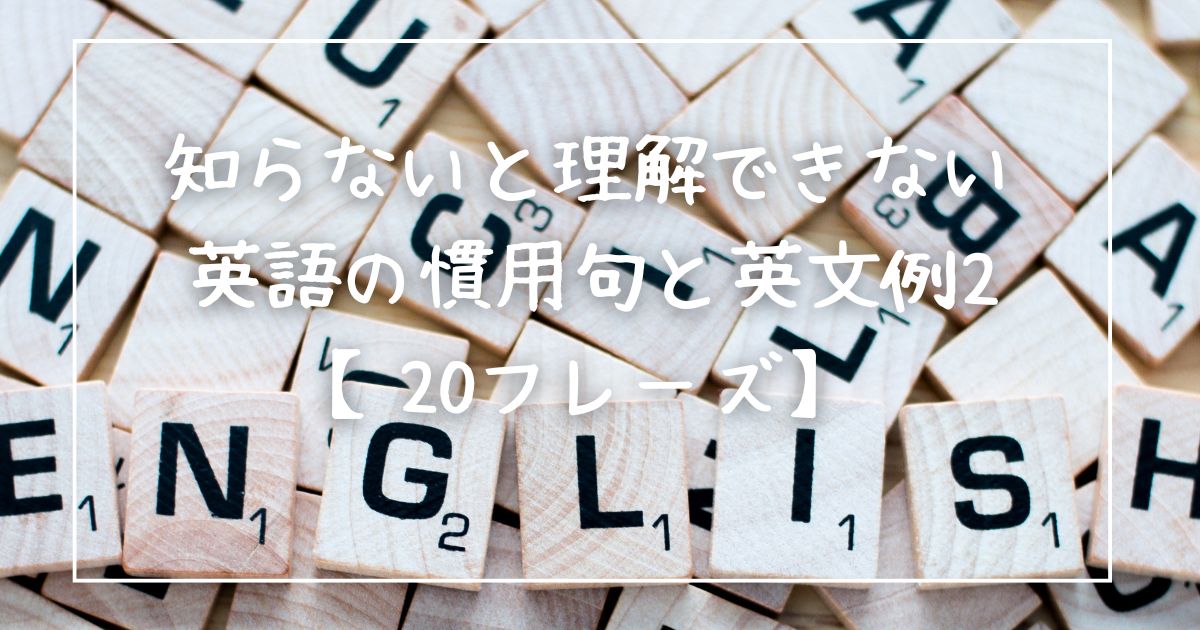英語の熟語や慣用句を知らなければ、例え単語の意味を知っていても意味が理解することが出来ません。今回は英語で用いられる熟語や慣用句について勉強しましょう。
これらのフレーズを知ることで、自然な英語での会話を楽しむことが出来ます。
知らないと理解できない英語の慣用句と英文例2【20フレーズ】
-
add insult to injury:追い打ちをかける
英:To add insult to injury, they fired him after he made the mistake.
日:ミスを犯した後、さらに追い打ちをかけるように彼は解雇された。
-
a blessing in disguise:不幸中の幸い
英:Losing that job was a blessing in disguise because it led me to a better career.
日:あの仕事を失ったのは不幸中の幸いだった。なぜなら、もっと良いキャリアに繋がったからだ。
-
a dime a dozen:ありふれたもの
英:Cheap souvenirs are a dime a dozen at tourist spots.
日:観光地では安いお土産がありふれている。
-
barking up the wrong tree:的外れなことをする
英:If you think I’m responsible, you’re barking up the wrong tree.
日:私が責任を負っていると思うなら、それは的外れだ。
-
beat a dead horse:無駄なことをする
英:Let’s not beat a dead horse. We already decided on this issue.
日:無駄なことはやめよう。この問題については既に決定した。
-
bent out of shape:怒る
英:He got all bent out of shape when he was criticized.
日:彼は批判された時、すごく怒った。
-
bite off more than you can chew:手に余ることをする
英:She bit off more than she could chew by taking on that extra project.
日:彼女はあの追加プロジェクトを引き受けることで、手に余ることをしてしまった。
-
blow off steam:ストレスを発散する
英:He goes for a run every evening to blow off steam.
日:彼はストレスを発散するために毎晩走りに行く。
-
break the bank:大金を使う
英:Going on vacation doesn’t have to break the bank.
日:休暇に行くのに大金を使う必要はない。
-
burn bridges:関係を断つ
英:You shouldn’t burn bridges with former employers.
日:前の雇用主と関係を断つべきではない。
-
by the skin of one’s teeth:かろうじて
英:He escaped the burning building by the skin of his teeth.
日:彼はかろうじて燃えている建物から逃れた。
-
call it a day:切り上げる
英:We’ve done enough work for today. Let’s call it a day.
日:今日はもう十分働いた。切り上げよう。
-
cut to the chase:核心に触れる
英:Let’s cut to the chase and discuss the main issue.
日:核心に触れて主要な問題について話し合おう。
-
drive someone up the wall:イライラさせる
英:The constant noise is driving me up the wall.
日:絶え間ない騒音が私をイライラさせる。
-
easier said than done:言うは易く行うは難し
英:Finding a good job is easier said than done.
日:良い仕事を見つけるのは言うは易く行うは難しだ。
-
every cloud has a silver lining:どんな悪い状況にも良い面がある
英:Don’t worry about failing the exam; every cloud has a silver lining.
日:試験に失敗しても心配しないで。どんな悪い状況にも良い面がある。
-
feel under the weather:体調が悪い
英:She felt under the weather after eating the leftovers.
日:彼女は残り物を食べた後、体調が悪くなった。
-
find your feet:慣れる
英:It took a few weeks to find my feet in the new job.
日:新しい仕事に慣れるのに数週間かかった。
-
get a taste of your own medicine:自業自得
英:He was rude to others, but he got a taste of his own medicine when he was ignored.
日:彼は他人に無礼だったが、無視された時に自業自得を味わった。
-
get cold feet:急に怖気づく
英:She got cold feet before her wedding.
日:彼女は結婚式の前に急に怖気づいた。


